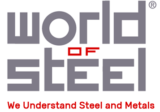Features of TFS (ECCS)
Features of TFS (ECCS)
- Excellent paint adhesion
TFS has excellent paint adhesion properties which is far better than those of tinplate. The external surfaces of cans should be painted to prevent corrosion. The internal surfaces should also be painted to prevent corrosion except when the content is motor oil or cooking oil.
- Excellent heat resistance
High-temperature baking of TFS causes neither discoloration nor deterioration in material properties.
- Excellent resistance to sulphur blackening
The metallic chromium in TFS has excellent sulphide resistance when canning protein-rich foodstuff, whereas ETP requires expensive sulphur resistant lacquer; Due to it TFS is the most suitable material or making fish cans.
- Excellent corrosion resistance
TFS steel has very good corrosion resistance after painting. It is normally used with both surfaces painted. It can also be used with the internal surface unpainted depending on the contents. TFS tends to rust in a humid atmosphere hence it should be used as soon as possible after unpacking.
- Excellent alkali resistance
The chromium coating in TFS is not amphoteric, making TFS a preferred choice for packing alkaline products such as detergents and pigment dispersants.
- Weldability
The metallic coating layer of TFS has a high electrical resistance. When welding TFS, it is necessary that the metallic coating layers in the welded area is removed in advance. Weldability of TFS is inferior to tinplate.
Since the hardness of chrome is higher than that of tin, TFS is more resistant to the cutting than electrolytic tinplate and this exposes the dies to higher wear. Consequently, lubrication is needed during cutting operations
